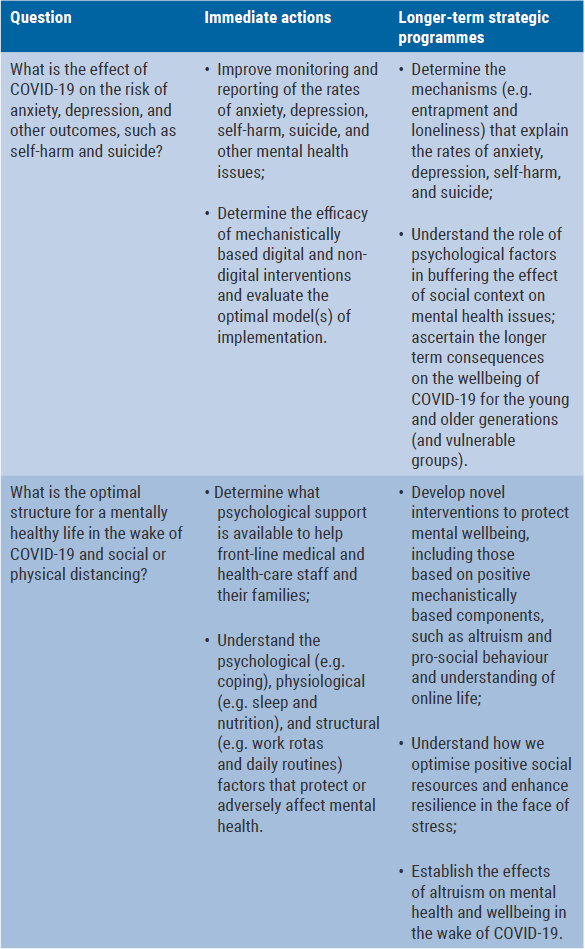Prof. Holmes introduced a position paper that she and her co-authors published in April 2020, which summarises the priorities that were developed together by an interdisciplinary group of 24 world-leading experts, including people who have experience with mental health issues [2]. One of the topics that Prof. Holmes brought forward was the actions and strategies developed by the group of experts in response to the effect of COVID-19 on mental health (see Table).
Table: Actions and strategies for mental health during COVID-19 [2]

Another important issue is the mental health consequences of the COVID-19 lockdown and social isolation for vulnerable groups and the way that these may be mitigated during the pandemic. There is no easy solution for this, as the acute or long-term consequences of the lockdown and social isolation on mental health are not yet known.
As a result of lockdown and isolation, some individuals may experience excess feelings of distress and impairment to social and occupational functioning. It may well be the case that the most vulnerable individuals may suffer the most from some of the measures taken to control the pandemic. Especially individuals who have existing mental health issues, including severe mental illness, might be particularly affected by relapse, disruptions to services, isolation, the possible exacerbation of symptoms in response to pandemic-related information and behaviours, and changes in mental health law.
Apart from a call-to-action that multidisciplinary mental health science research must be central to the international response to the COVID-19 pandemic, another priority is collecting high-quality data on the mental health and psychological effects of the COVID-19 pandemic across the whole population and in specific vulnerable groups, and on brain function, cognition, and mental health for patients with COVID-19 in all disease stages. “This is much needed to deliver interventions under pandemic conditions”, Prof. Holmes said. “We are all in this together. Let’s think about interventions to reduce the disparities, the mental health inequalities that are being expanded by the COVID-19 pandemic [1].”
- Holmes EA, et al. The COVID-19 pandemic: challenges, priorities, and opportunities for mental health science. CA.01. ECNP Congress 2020.
- Holmes EA, et al. Lancet Psychiatry. 2020;7(6):547-560.
Posted on
Previous Article
« Microdosing psychedelics offers perspective but needs further evaluation Next Article
Heart rate could be a potential biomarker for depression »
« Microdosing psychedelics offers perspective but needs further evaluation Next Article
Heart rate could be a potential biomarker for depression »
Table of Contents: ECNP 2020
Featured articles
Psychosis and Schizophrenia
Prognostic tools in the management of clinical high risk for psychosis
Reduced auditory cortex activation during speech perception in patients with schizophrenia
Dementia
Predicting MCI and dementia by assessing worrying about memory
Genomics of vascular dementia and stroke
Bipolar Disorders
Social media and bipolar disorder: a risky combination
How to prevent the onset and first relapse of bipolar disorders?
Seasonal pattern and bipolar disorder
OCD and Depression
Personalised medicine in depression: a realistic way forward?
Heart rate could be a potential biomarker for depression
Listening to Mozart has a beneficial effect on epilepsy
Mental Health
Mental health during the COVID-19 pandemic
Microdosing psychedelics offers perspective but needs further evaluation
The PRISM project: focusing on biological parameters across neuropsychiatric disorders
Smartphone can support personalised medicine in psychiatry
Baby’s heart rate shows stress if their mother is depressed or anxious
Autism and ADHD
Movement computing promising in analysing motor impairment in children with autism spectrum disorder
Screening with ADHD Self-Report accurate in girls
No altered fractional anisotropy in ADHD
Role of the Microbiome
Micronutrient supplementation as treatment for psychiatric symptoms
Substance Abuse
Altered gene expression of endogenous opioid system after alcohol exposure in adolescent rodents
Subgroups in alcohol use disorder based on externalising symptoms
New drugs for alcohol use disorder to focus on combination therapy
Related Articles
November 2, 2020
Micronutrient supplementation as treatment for psychiatric symptoms
© 2024 Medicom Medical Publishers. All rights reserved. Terms and Conditions | Privacy Policy
HEAD OFFICE
Laarderhoogtweg 25
1101 EB Amsterdam
The Netherlands
T: +31 85 4012 560
E: publishers@medicom-publishers.com

